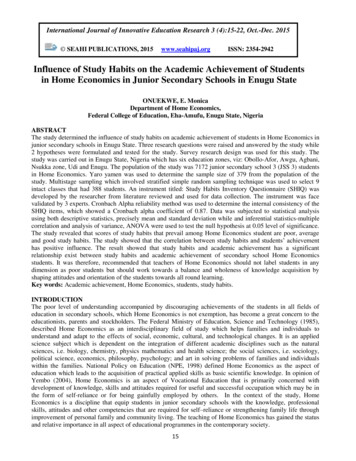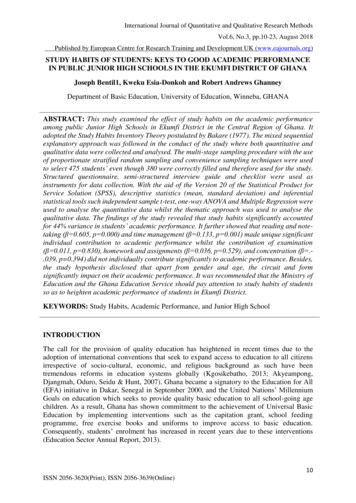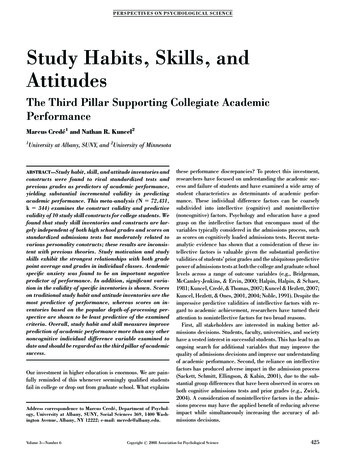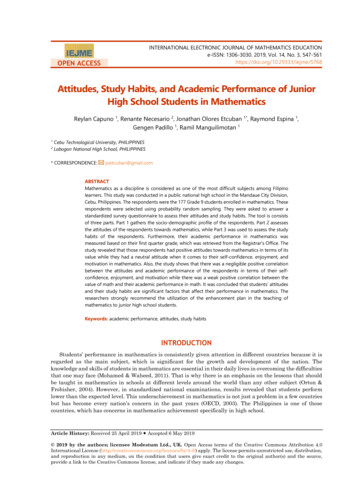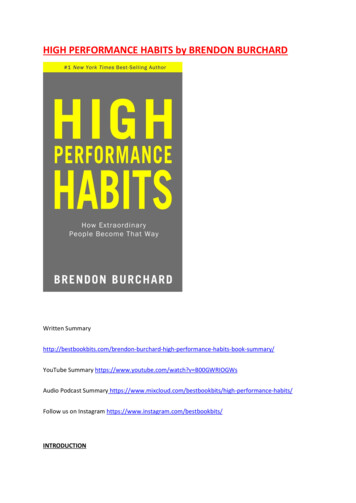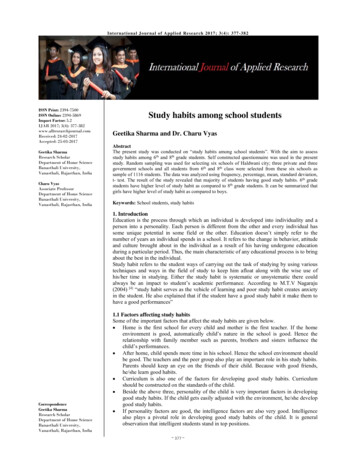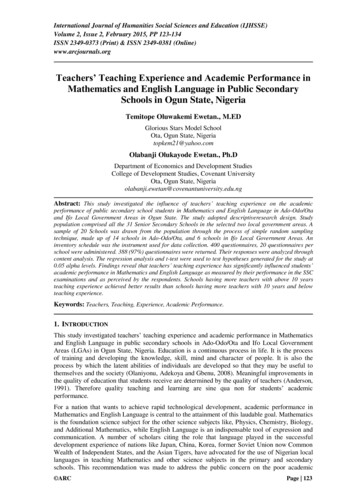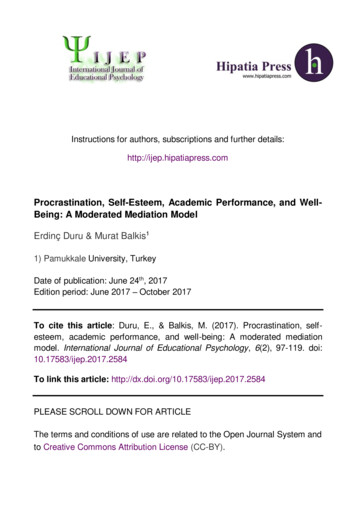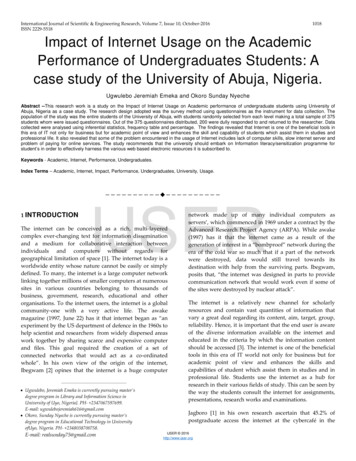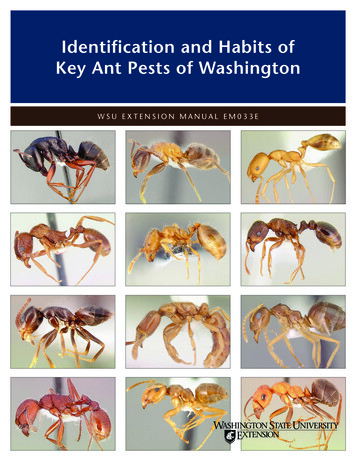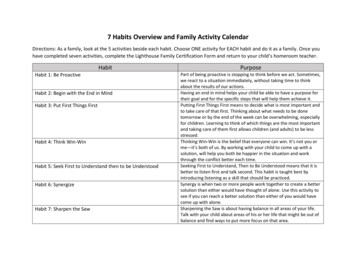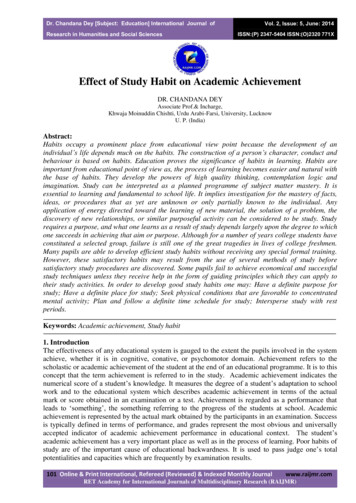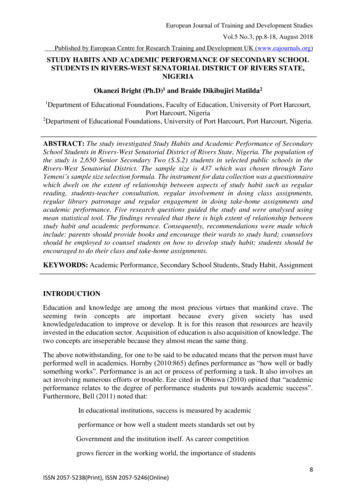
Transcription
European Journal of Training and Development StudiesVol.5 No.3, pp.8-18, August 2018Published by European Centre for Research Training and Development UK (www.eajournals.org)STUDY HABITS AND ACADEMIC PERFORMANCE OF SECONDARY SCHOOLSTUDENTS IN RIVERS-WEST SENATORIAL DISTRICT OF RIVERS STATE,NIGERIAOkanezi Bright (Ph.D)1 and Braide Dikibujiri Matilda21Department of Educational Foundations, Faculty of Education, University of Port Harcourt,Port Harcourt, Nigeria2Department of Educational Foundations, University of Port Harcourt, Port Harcourt, Nigeria.ABSTRACT: The study investigated Study Habits and Academic Performance of SecondarySchool Students in Rivers-West Senatorial District of Rivers State, Nigeria. The population ofthe study is 2,650 Senior Secondary Two (S.S.2) students in selected public schools in theRivers-West Senatorial District. The sample size is 437 which was chosen through TaroYemeni’s sample size selection formula. The instrument for data collection was a questionnairewhich dwelt on the extent of relationship between aspects of study habit such as regularreading, students-teacher consultation, regular involvement in doing class assignments,regular library patronage and regular engagement in doing take-home assignments andacademic performance. Five research questions guided the study and were analysed usingmean statistical tool. The findings revealed that there is high extent of relationship betweenstudy habit and academic performance. Consequently, recommendations were made whichinclude: parents should provide books and encourage their wards to study hard; counselorsshould be employed to counsel students on how to develop study habit; students should beencouraged to do their class and take-home assignments.KEYWORDS: Academic Performance, Secondary School Students, Study Habit, AssignmentINTRODUCTIONEducation and knowledge are among the most precious virtues that mankind crave. Theseeming twin concepts are important because every given society has usedknowledge/education to improve or develop. It is for this reason that resources are heavilyinvested in the education sector. Acquisition of education is also acquisition of knowledge. Thetwo concepts are inseperable because they almost mean the same thing.The above notwithstanding, for one to be said to be educated means that the person must haveperformed well in academics. Hornby (2010:865) defines performance as “how well or badlysomething works”. Performance is an act or process of performing a task. It also involves anact involving numerous efforts or trouble. Eze cited in Obinwa (2010) opined that “academicperformance relates to the degree of performance students put towards academic success”.Furthermore, Bell (2011) noted that:In educational institutions, success is measured by academicperformance or how well a student meets standards set out byGovernment and the institution itself. As career competitiongrows fiercer in the working world, the importance of students8ISSN 2057-5238(Print), ISSN 2057-5246(Online)
European Journal of Training and Development StudiesVol.5 No.3, pp.8-18, August 2018Published by European Centre for Research Training and Development UK (www.eajournals.org)doing well in school has caught the attention of parents,legislators and government education departments pp143.To further buttress the fore-goings, especially on the clarification of the concept of academicperformance, Braide (2018) posits that:Most people know that academic performance generallyrefers to how well a student is accomplishing his or her taskand lessons, but there are quite a number of factors that maydetermine the level and quality of students’ academic performancepp1.In tertiary level of education, performance is assessed in various ways. For systematic scoring,learners prove their knowledge by undertaking oral or written test, performing presentations asis done in seminars, partaking in classroom activities, discussions and submission of take-homeassignments. In the Nigerian secondary school system, learners are evaluated through homeworks, assignments, test, examinations etc (Obinna 1998).It is however important to note that the academic achievement of learners may well be marredor enhanced depending on their approach to studying. Study is the activity of learning orgaining knowledge either from books or by examining things in the world. Studying is theprocedure of getting information from prints that is information stored in written materials(magazines, newspapers, books). Mace (2002) opines that study is an organized gaining ofintelligence and an interpretation of information and ideologies that calls for memorizing andusage. Kelly (1998) specified that study is the utilization of person’s intellectual ability to thegaining, comprehending and arrangement of information; doing it over and over again entailssome method of formal learning. Okorodudu (2000) is of the view that study is a course oftopic mastery. Studying entails diligence as it concerns a specified person engaged in it.Habit is a thing that one does often and almost without thinking; especially something that ishard to stop doing (Hornby 2000:530). It is identified as a way of doing something. A person’shabit consists of a unique ways of how specific things are allowed or done by such individualor person. Habit is relative to person or people. Each human being acts in a unique way. Thisis so because nature made things uniquely. The temperament and general attitude of a personis not the same with that of another person or individual.Considering the exposition on the concept of habit and study, it can then be said that studyhabit refers to the consistent ways a person does with regards to gaining knowledge. Hussaincited in Braide (2018:2) opines that study habit is the predispositions which learners haveacquired regarding isolated studying over time. Since habits exemplify uniqueness in anindividual, study routines are the activities of person related to studies. Study habits are routinesof implementing and practicing abilities of learners in learning processes for gaining mastery.Study habit functions as the propeller of learning. A student’s learning character ischaracterized by his study habits. Study habits are the various attitudes, methods techniquesand strategies which individual students adopt while studying. Individual behaviour is guidedby habit, therefore, in the process of studying, the various habits or techniques students adoptare what define their performance. The above bring to the fore, the importance of both study9ISSN 2057-5238(Print), ISSN 2057-5246(Online)
European Journal of Training and Development StudiesVol.5 No.3, pp.8-18, August 2018Published by European Centre for Research Training and Development UK (www.eajournals.org)and habit in a student’s life yet the actual implications are unknown. The uncertainty of theeffect of study habit on the academic performance of students remains a source of concernespecially with regards to Rivers-West Senatorial District of Rivers State, Nigeria hence thedecision to embark on this study.Statement of the ProblemEducation has been identified as an important social institution. Those enrolled in education(academic programme) know that they are there to achieve success which will be beneficial tonot only the student but also his family and the society at large. It is factual after all thateducation serves as a means of liberation, illumination and upward social mobility. Consideringthe importance of education, it is expected that those who have enrolled in any academicprogramme should study very hard in order to pass examination with flying colours.Unfortunately, performances in examinations especially secondary school level have been sopoor. Studying is quite significant, as no learning process, activity or situation can be effectivewithout studying. But one problem that seems to confront the Nigerian educational system isthe consistent failure of learners in national examinations specifically, at the secondary schoollevel of learning. (Ajayi, 2012).The above assertion is further corroborated by Adesulu (2018:9) as he reported that “WestAfrican Examinations Council, WAEC, has released results of West African Senior SecondarySchool Certificate Examination WASSCE, for private candidates in 2018 - first series,yesterday in Lagos with 17.13 percentage pass in English language and Mathematics.”The high rate of failure is indeed a source of worry to all and sundry. What could be the reasonfor the mass failure? Could it be a factor of study h abit among secondary school students?The curiosity to proffer solutions to this problem resulted in the choice to undertake the studyon this topic.Aim and Objectives of the StudyThe aim of the study is to investigate the relationship between study habits and studentsacademic performance. Specifically, the objectives of the study are:1. To find out the relationship between regular reading as an aspect of study habit andstudents’ academic performance.2. To find out the relationship between student-teacher consultation as an aspect of studyhabit and students’ academic performance.3. To ascertain the relationship between regular involvement in doing class assignmentsas an aspect of study habit and students’ academic performance.4. To determine the relationship between regular library patronage as an aspect of studyhabit and students’ academic performance.5. To examine the relationship between regular engagement in doing take-homeassignments as an aspect of study habit and students’ academic performance.10ISSN 2057-5238(Print), ISSN 2057-5246(Online)
European Journal of Training and Development StudiesVol.5 No.3, pp.8-18, August 2018Published by European Centre for Research Training and Development UK (www.eajournals.org)Research QuestionsThe following research questions were formulated to guide the study:1. What extent is the relationship between regular reading as an aspect of study habit andstudents’ academic performance?2. What extent is the relationship between student-teacher consultation as an aspect ofstudy habit and students’ academic performance?3. To what extent is the relationship between regular involvement in doing classassignments as an aspect of study habit and students’ academic performance?4. To what extent is the relationship between regular library patronage as an aspect ofstudy habit and students’ academic performance?5. What extent is the relationship between regular engagement in doing take-homeassignments as an aspect of study habit and students’ academic performance?METHODOLOGYThe study adopted a correlational research design. The choice of this research design stemsfrom the fact that the study measures the strength of association between variables. In otherwords, the study aims at establishing relationship. The study was carried out in Rivers-WestSenatorial District of Rivers State, Nigeria. The population of the study is 2,650 which is allSenior Secondary Two (SS2) students in selected public schools in the Rivers-West SenatorialDistrict of Rivers State, Nigeria as at when this study was conducted. The sample size is 347which was chosen through Taro Yemeni’s sample size technique as a representative of thepopulation. Stratified random sampling technique and simple random sampling technique wasadopted. The instrument was structured questionnaire designed by the researchers. It was a 20item instrument designed in a four Likert scale response of Very High Extent (VHE), HighExtent (HE), Low Extent (LE) and Very Low Extent (VLE). The instrument had two sections.Section ‘A’ was for the respondents’ bio-data while section ‘B’ is designed to elicit informationbothering on the research questions. The face and content validities were scrutinized andapproved by an expert in Test and Measurement. For the reliability of the instrument, a test retest method was used and Cronbach alpha was employed which gave a coefficient of 0.71. Thisconfirms that the instrument was reliable. Based on the above, copies of the questionnaire wereadministered directly to the respondents and retrieved on the spot. Mean statistical tool wasused in analyzing the research questions.11ISSN 2057-5238(Print), ISSN 2057-5246(Online)
European Journal of Training and Development StudiesVol.5 No.3, pp.8-18, August 2018Published by European Centre for Research Training and Development UK (www.eajournals.org)RESULTSResearch Question One: What extent is the relationship between regular reading as an aspectof study habit and students’ academic performance?Table 1: Mean score analysis of the extent of relationship between regular reading as anaspect of study habit and students’ academic hat extent of the following isthe relationship betweenregular reading as an aspect ofstudy habit and students’academic performance?166(664)I draw reading schedule and I amresolute in keeping to tentThe number of friends arereduced to avoid distraction fromreading ghExtentMy involvement in extracurricular activities are reduced tohave adequate reading ent167(501)44(88)54(54)347(971)2.8HighExtent3.4.I become sad anytime readingschedule is not followed.Total meanGrand Mean12.33.1From Table 1 above, each of the items has Mean that is above 2.50 which is the standardreference point which indicates that each of the items showed high relationship. This is equallyrevealed in the grand mean of 3.1.12ISSN 2057-5238(Print), ISSN 2057-5246(Online)
European Journal of Training and Development StudiesVol.5 No.3, pp.8-18, August 2018Published by European Centre for Research Training and Development UK (www.eajournals.org)Research Question Two: What extent is the relationship between student-teacher consultationas an aspect of study habit and students’ ac
Study habits are the various attitudes, methods techniques and strategies which individual students adopt while studying. Individual behaviour is guided by habit, therefore, in the process of studying, the various habits or techniques students adopt are what define their performance. The above bring to the fore, the importance of both study . European Journal of Training and Development .
